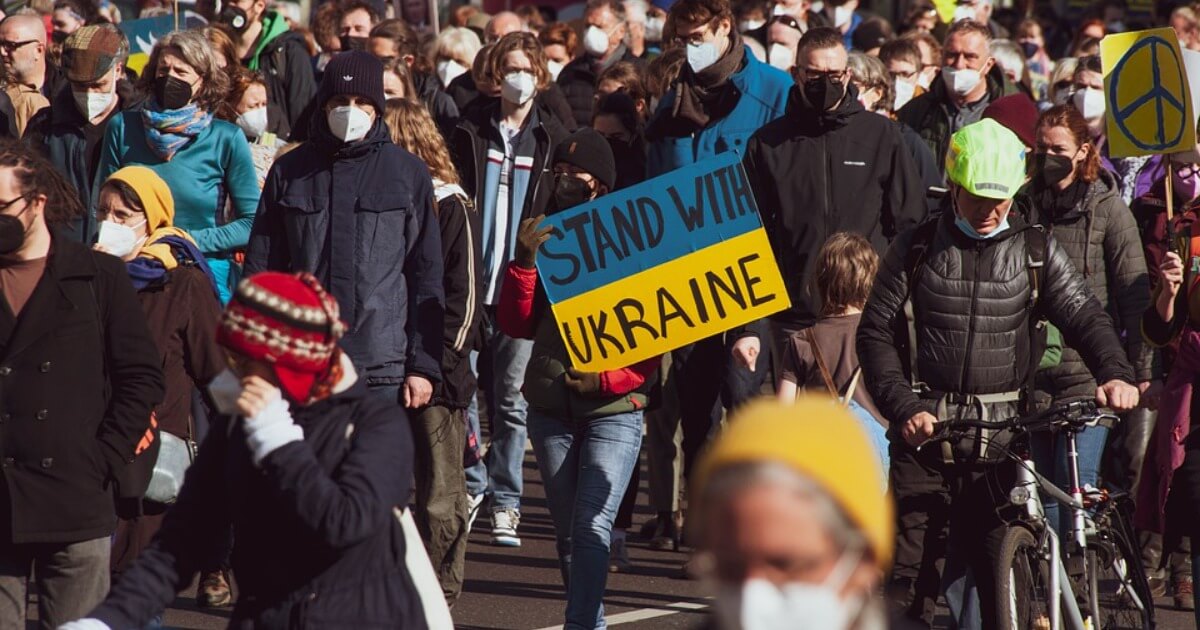Russia-Ukraine: Could an Istanbul Deal Have Brought Peace?
The experience of the post-Soviet republics with security-related agreements with Moscow is such that the 2022 Russian-Ukrainian talks had little chance of success.
July 28, 2024

A Strategic Intervention Paper (SIP) from the Global Ideas Center
You may quote from this text, provided you mention the name of the author and reference it as a new Strategic Intervention Paper (SIP) published by the Global Ideas Center in Berlin on The Globalist.
There are those who believe that Moscow’s signing of a document at Istanbul in 2022 – if one allows for the possibility of such scenario at all – might have resulted in temporary lowering of tensions in Russia’s war in Ukraine.
However, judging from previous Russian behaviour, the apparent deal would have, as in the case of the 2014 Minsk accords, resulted in another subversion of international law.
Above all, a hypothetical Istanbul accord would, most likely, not have been observed by Moscow. After all, Russia has an abysmal record of implementing political and security arrangements with the former Soviet republics. To this day, Russia is keen on meddling in the internal affairs of former Soviet republics.
Let’s consider past experience
Simply put, the ongoing bout of speculation about the Russo-Ukrainian negotiations in Belarus and Turkey in the February to April 2022 timeframe – and the alternative peace history for Ukraine that is now discussed does not consider past experience.
That experience makes it plain that, even if an accord had been reached in Istanbul, it would not have led to a decline in Russian military aggressiveness and territorial appetite. On the contrary, the next Russian invasion has typically been worse than the last.
Russia’s series of broken promises on Ukraine
Cases of Kremlin legal nihilism and Russian non-fulfilment of signed accords with tragic consequences have been legion during the last 35 years. Numerous older agreements between Moscow and Kyiv that were foundational for the international relations of the post-Soviet space have been broken.
The most consequential one was the December 1991 Belovezha Agreement between Russia, Belarus and Ukraine, which dissolved the Soviet Union, an event that Putin famously described in 2005 as “the greatest geopolitical catastrophe of the 20th century”.
In this historic – and fully ratified – treaty, the three countries established the Commonwealth of Independent States and consensually fixed and promised to respect their new state borders – including that Crimea, Sevastopol and Donbas belonged to Ukraine. Article 5 of the Belovezha Agreement states that: “The High Contracting Parties acknowledge and respect each other’s territorial integrity and the inviolability of existing borders within the Commonwealth”.
The infamous Budapest Memorandum on Security Assurances
Another historic document followed almost exactly three years later – the by now infamous Budapest Memorandum on Security Assurances. This appendix to the 1968 Nuclear Non-Proliferation Treaty (NPT) of Moscow, Washington and London, was negotiated during the last and fateful CSCE summit at Hungary in December 1994.
After the break-up of the USSR, Kyiv for a short time had the world’s third-largest nuclear weapon arsenal. In exchange for Ukraine handing over of its nuclear warheads to Russia, Budapest Memorandum promised Kyiv that Moscow (sic!), Washington and London would respect Ukraine’s state borders, territorial integrity and political sovereignty.
Ukraine committed in 1994 not only to dismantle its unusable strategic rockets, but also to transfer to Russia all other weapons of mass destruction and material that could be used to build them. The same applied to Ukraine’s various inherited delivery systems, such as bombers or missiles.
Read the words of the agreement
The three depositary states of the NPT, including Russia, state in the 1994 memorandum’s first two articles:
“1. The United States of America, the Russian Federation, and the United Kingdom of Great Britain and Northern Ireland, reaffirm their commitment to Ukraine, in accordance with the principles of the CSCE Final Act, to respect the Independence and Sovereignty and the existing borders of Ukraine. 2. The United States of America, the Russian Federation, and the United Kingdom of Great Britain and Northern Ireland, reaffirm their obligation to refrain from the threat or use of force against the territorial integrity or political independence of Ukraine, and that none of their weapons will ever be used against Ukraine except in self-defense or otherwise in accordance with the Charter of the United Nations.”
Russia’s total disregard for legal commitments
Beginning in 2014, the legal commitments made 20 years earlier have been broken by Moscow in an ever more egregious way. Russia not only set up so-called people’s republics on Ukrainian soil, it also officially annexed Ukrainian regions in March 2014 and September 2022, including in the latter case territories and even entire cities it does not control.
Most of the deals signed in connection with the Russo-Ukrainian War were also violated by Moscow. The most infamous of them were the so-called Minsk Agreements, which Kyiv signed at gunpoint in 2014 and 2015.
The Minsk “Agreements”
In the September 2014 Minsk Protocol (“Minsk-I”), the Ambassador of Russia to Ukraine undersigned to “withdraw illegal armed groups and military equipment as well as fighters and mercenaries from the territory of Ukraine”.
In the February 2015 Minsk Package of Measures (“Minsk-II), Moscow again promised a “withdrawal of all foreign armed forces, military equipment, as well as mercenaries from the territory of Ukraine under the supervision of the OSCE [as well the] [d]isarmament of all illegal groups”.
The Kremlin never gave any sign of starting in earnest to fulfil these and other promises and probably never intended to do so.
Serially breaking agreements = Russia’s pattern (not just Putin’s)
Of Russia’s broken agreements, those which might be most important for assessing the chances of a putative Istanbul deal in 2022 are, however, those that do not concern Ukraine and that were signed when Putin was not president.
That is because Russia’s pattern of – at first glance unrelated – annulments indicate a wider pathology in Russia’s approach to its so-called near abroad (i.e., the post-Soviet space).
Indeed,treaty violations unrelated to Ukraine illustrate the existence of a broader pattern of behaviour that does not just concern Ukraine and is not only shaped by the personality of Putin.
The Moldovan and Georgian cases
In October 1994, Moscow signed an Agreement between the Russian Federation and the Republic of Moldova regarding the legal status, procedure and period for the withdrawal of the Russian Federation Military Units/Formations, temporarily situated in the territory of the Republic of Moldova. In its crucial article 2, the Kremlin promised:
“The Russian side shall in accordance with technical capabilities and the time required to arrange the new deployment site for the troops, withdraw these military forces within three years of the date this agreement enters into force. Practical steps for the withdrawal of the Russian Federation military units from the territory of the Republic of Moldova, within the framework of this deadline will be synchronized with the political settlement of the Transnistrian conflict and the determination of a special status for the Transnistrian region of the Republic of Moldova.”
In the same year, the Republic of Moldova adopted its new post-Soviet Constitution in which it defined itself as a neutral state. Article 11 of the still current 1994 Moldovan Constitution states: “The Republic of Moldova proclaims its permanent neutrality. […] The Republic of Moldova does not admit the stationing of any foreign military troops on its territory”.
How Russia plays Moldova
Nonetheless, the remnants of the 14th Russian Army, now called the “Operational Group of Russian Forces,” remain on the Republic of Moldova’s territory against Chisinau’s will and in contravention to the 1994 Russia-Moldova treaty.
Nor was the territorial conflict in Transnistria resolved within the three-year period mentioned in Moscow’s 1994 treaty with Chisinau. Moldova’s constitutional exclusion of its accession to NATO and of the hosting of foreign troops on its territory – also major topics in the ongoing debate about a possible Russian-Ukrainian compromise – were then as now ignored by Moscow.
Russian troops remain on Moldovan territory 30 years later, in violation of Moldova’s Constitution, as does the so-called Transnistrian-Moldovan Republic as a pseudo-state and satellite of Russia.
How Russia plays Georgia
Russia’s attitude to Georgia and the August 2008 ceasefire agreement between Moscow and Tbilisi tell a somewhat similar story. The deal was signed by the two countries’ then presidents, Dmitrii Medvedev and Mikheil Saakashvili.
It was also called the “Sarkozy Plan” after the then President of France, Nicolas Sarkozy. France at that time held the rotating presidency of the European Union, which had mediated the deal. The agreement ended the five-day 2008 Russian-Georgian War.
Article 5 prescribed a withdrawal of Russian troops, which a few days before had entered Abkhazia and the Tskhinvali Region, to their initial positions in Russia: “The Armed Forces of the Russian Federation will be withdrawn to the line before the start of armed actions”.
Deceiving Georgia, deceiving the EU
Nonetheless, Moscow left a significant number of its troops on Georgian territory, in a manifest violation of the August agreement. Worse still, it recognized Abkhazia and so-called South Ossetia, i.e., the Tskhinvali Region, as independent states at the end of August 2008.
Moscow’s initial approval and signing of the soon-to-be abandoned Sarkozy Plan was, it turned out, not only a deception of Georgia. It was also designed to mislead the European Union, with which Moscow had wanted to maintain good relations, in that period.
No alternative history
Perhaps, contrary to what most serious analysts have concluded, there was a slim chance that Kyiv might have signed a document with Moscow in Istanbul in the spring of 2022. We will never know for sure.
What we do know from recent experience is how and why post-Soviet Russia engages in peace talks. The Kremlin sees putative peace deals as one of several instruments in its hybrid warfare against post-Soviet states that do not accept Russian hegemony.
We would probably have seen Russian behaviour at and after the Istanbul talks that follows a familiar pattern from the past: having invaded the post-Soviet state, Moscow pushes through a slanted agreement at gunpoint.
As the two Minsk Agreements indicate, an Istanbul agreement would probably have in itself already been a transmogrification of international law.
In a second step, Moscow would not implement some crucial points even of the imbalanced document. Under some pretext, Moscow would de facto withdraw its approval for the agreed deal while continuing to insist on implementation of those points that it favours.
Moscow = Master of deception, betrayal and blatant propaganda
Of course, the height of irony – and deceitfulness – is that Russia itself often complains loudly about supposed misbehaviour by its weaker negotiating partners before, during and after the signing of a document.
The pattern of Kremlin spokespersons is to consistently demand full implementation of those articles in which they are most interested, as well as acceptance of Moscow’s own interpretation of them.
At the same time, the Kremlin has been highly “flexible” concerning its own material obligations – be they those emerging from multilateral or bilateral agreements between Moscow and other post-Soviet states.
Conclusion
It is no surprise that the Kremlin’s political unreliability has often concerned exactly those Russian obligations that were critical for the accords to make any sense.
Against the background of the record detailed above as well as other similar episodes, there is little reason to seriously discuss the 2022 Istanbul talks as a missed chance for achieving peace and stability along the Russo-Ukrainian border.
Takeaways
Cases of Kremlin legal nihilism and Russian non-fulfilment of signed accords with tragic consequences have been legion during the last 35 years.
Even if an accord had been reached in Istanbul in 2022, it would not have led to a decline in Russian military aggressiveness and territorial appetite regarding Ukraine.
Russia’s pattern of annulments of peace deals indicate a wider pathology in Russia’s approach to its so-called near abroad (i.e., the post-Soviet space).
The Kremlin sees putative peace deals as one of several instruments in its hybrid warfare against post-Soviet states that do not accept Russian hegemony.
The height of irony – and deceitfulness – is that Russia itself often complains loudly about supposed misbehaviour by its weaker negotiating partners before, during and after the signing of a document.
A Strategic Intervention Paper (SIP) from the Global Ideas Center
You may quote from this text, provided you mention the name of the author and reference it as a new Strategic Intervention Paper (SIP) published by the Global Ideas Center in Berlin on The Globalist.


